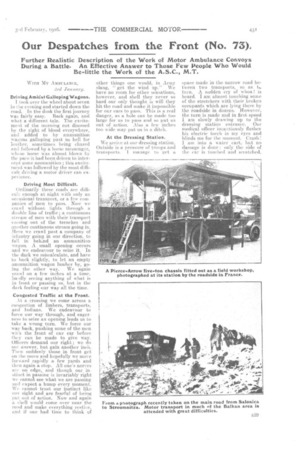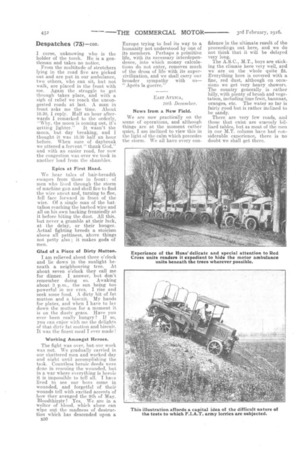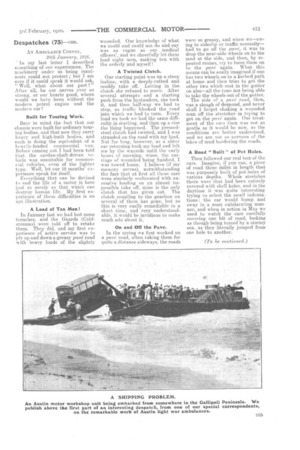Our Despatches from the Front (Non 73),
Page 7

Page 8

Page 9

If you've noticed an error in this article please click here to report it so we can fix it.
Further Realistic Description of the Work of Motor Ambulance Convoys During a Battle. An Effective Answer to Those Few People Who Would• Be-little the Work of the A.S.C., M.T.
WITH Mr AMBULANCE,
3rd January.
Driving Amidst Galloping Wagons.
I took over the wheel about seven in the evening and started down the road. In the dusk the first journey was fairly easy. Back again, and what a different tale. The excitement of the morning not dimmed by the sight of blood everywhere, and added to by ammunition wagons galloping past us hell for leather, sometimes being chased and followed by a horse messenger,
whose horse was almost blown by th P pace it had been driven to intercept some ammunition ; this excite ment was followed by the most difficult driving a motor driver can experience.
Driving Most Difficult.
Ordinarily these roads are difficult enough at night with only an occasional transport-, or a few companies of men to pass. Now we crawl without. lights through a double line of traffic ; a continuous stream of men with their transport coming out of the trenches and another continuous stream going in. Here we crawl past a company of infantry going in our direction, to fall in behind an ammunition wagon. A small opening occurs and we endeavour to seize it. In the dark we miscalculate, and have to back slightly, to let an empty ammunition wagon lumber by, going the other way. We again crawl on a few inches at atime, hardly seeing anything of what is in front or passing us, but in the dark feeling our wary all the time.
Congested Traffic at the Front, At a crossing we come across a congestion of limbers, transports, and Indians. We endeavour to force. our way through, and eagerness to seize an opening leads us to take a wrong turn. We force our way back, pushing some of the men with the front of our car before tiny can be made to give way. Officers demand our right ; we do not answer, but gain another inch. Then suddenly those in front get on the move and hopefully we move Torward rapidly a few yards and
he again a stop. All one's nerves arc on edge, and though our instinct in passing is invariably rightwe
cannot see what we are passing and expect a bump every moment. We cannot trust our instinct like our sight and are fearful of being putout of action. Now and again a shell would come over near the road and make everything restive, and if one had time to think of other things one would, in Army slang, "get the wind up." We have no room for other sensations, however, and shell they never so hard our only thought is will they hit the road and make it impossible for our cars to pass. This is a real danger, as a hole can be made too large for us to pass and so put us out of action, Also a few inches too wide may put us in a ditch.
At the Dressing Station.
We arrive at our dressing station. Outside is a pressure of troops and transports. I manage to get a space made in the narrow road between two transports, so as turn. A sudden cry of whoa is heard. I am almost touching some of the stretchers with their broken occupants which are lying there by the roadside in dozens. However, the turn is made and in first speed 1 am slowly drawing up to the dressing station entrance. Our medical officer incautiously flashes his electric torch in my eyes and blinds me for the moment. Crash I am into a water cart,but no damage is done only the side of the ear is touched and scratched. I curse, unknowing who is the holder of the torch. He is a gentleman and takes no notice.
From the multitude of stretchers lying in the road five are picked out and are put in our ambulance, two others, who can sit, but not walk, are placed in the front with me. Again the struggle to get through takes place, and with a sigh of relief we reach the uncongested roads at last. A man in front asks me the time. About 10.30, I reply. Half an hour afterwards I remarked to the orderly, "Why, the moon is corning out, it's
getting lighter." It wasn't the MOOD, but day breaking, and I thought it was 10.30 half an hour before. When sure of daybreak we uttered a fervent " thank God," and with an easier road, for now the congestion was over we took in another load from the shambles.
Epics at First Hand.
We hear tales of hair-breadth escapes from those in front : of men who lived through the storm of machine gun and shell fire to find the wire uncut and, turning to flee, fell face forward in front of the wire. Of a single man of the battalion reaching the barbed wire and all on his own hacking frenziedly at it before biting the dust. All this, but never a grumble at their luck, at the delay, or their hunger. Actual fighting breeds a stoicism above all pettiness, above things not petty also ; it makes gods of men.
Glad of a Piece of Dirty Mutton.
I am relieved about three o'clock and lie down in the sunlight beneath a neighbouring tree. At about seven o'clock they call me for dinner. I answer, but don't remember doing so. Awaking about 3 p.m., the sun being too powerful in my eyes. I rise and seek some food. A dirty bit of fat mutton and a biscuit. My hands for plates, and when I have to lay down the mutton for a moment it is on the dusty grass. Have you ever been really hungry ? If so, you can enjoy with me the delights of that dirty fat, mutton and biscuit. It was the finest meal I ever made !
Working Amongst Heroes.
The fight was over, but our work was not. We gradually carried in our shattered men and worked day and night until accomplishing the task. Countless heroic deeds were done in reselling the wounded, but in a war where everything is heroic it is impossible to tell all. I have lived to see our boys come in wounded, and forgetful of their wounds tell with excited accents of how they avenged the 0th of May. Bloodthirsty ? Yes. We are in a welter of blood, which alone can wipe out the madness of destruction which has descended upon a
B30 Europe trying to feel its way to a humanity not understood by one of its members. Perhaps a primitive life, with its necessary interdependence, into which money calculations do not enter, removes much of the dross. of life with its supercivilization, and we shall carry our broader sympathy with us" Apres la guerre."
EAST AFRICA, loth December.
News from a New Field.
We are now practically on the scene of operations, and although things are at the moment rather quiet, I am inclined to view this in the light of the calm which precedes the storm. We all have every con fidence in the ultimate result of the proceedings Out here, and we do not think that it will be delayed very long.
The A.S.C. J±LT., boys are sticking the climate here very well, and we are on the whole quite " fit. Everything here is covered with a fine, red dust, although on occasions we get very heavy showers. The country generally is rather hilly, with plenty of brush and vegetation, including lime fruit, bananas, oranges, etc. The water so far is fairly good but is rather inclined to be sandy.
There are very few roads, and those that exist are scarcely billiard tables, but as most of the men in our M.T. column have had considerable experience, there is no doubt we shall get there.
AN AMBULANCE CONVOY, 20th January, 1916.
In my last letter I described something of our experiences. The machinery under us being inanimate could not protest ; but I am sure if it could speak it would ask, " Well, what about our part ?" After all, be our nerves ever so strong, or our hearts good, where would we have been without the modern petrol engine and the modern ear?
Built for Touring Work.
Bear in mind the fact that our chassis were built for ordinary touring bodies, and that now they carry heavy and high-built bodies, and each is doing the equivalent of a Ii eavily-lo ad e d commercial van. Before coming out I had been told that the cardan-shaft-driven vehicle was unsuitable for commercial vehicles, even of the lighter type. Well, let our 12 months' experience speak for itself.
Everything that can he devised to end the life of a motor is here just as surely as that which can destroy human life. My first experience of these difficulties is an apt illustration.
A Load of Ten Men!
In January last we had lost some trenches, and the Guards (Coldstreams) were told off to retake them. They did, and my first experience of active service was to ply up and down a greasy pave road with heavy loads of the slightly
wounded. Our knowledge of what we could and could not do and say was as vague as our medical officers', and we cheerfully let them load eight men, making ten with the orderly and myself !
A Twisted Clutch.
Our starting point was up a steep incline, with a deeply-rutted and muddy take off. Letting in the clutch she refused to move. After several attempts and a starting push from the bystanders, she took it, and then half-Way we had to stop, as traffic blocked the road into which we had to turn. Every, load we took we had the same difficulty in starting, and then op. a rise the thing happened. The pressedsteel clutch had twisted, and I was stranded on the road with my load. Not for long, however, as a sister car returning took my load and left me by the wayside until the early hours of morning, when, the carriage of wounded being finished, I was towed home. I believe (if my memory serves), notwithstanding the fact that at first all these cars were similarly maltreated with excessive loading on an almost impossible take off, mine is the only clutch that has given out. The clutch coupling to the gearbox on several of them has gone, but as this is very easily remediable in a short time, and very understandable, it would be invidious to make much ado about it.
On and Off the Pave.
In the spring we first worked on a pave road, often taking them for quite a distance sideways, the roads were so greasy, and when we—owing to sideslip or traffic necessity— had to go off the pave, it was to drop the near-side wheels on to the mud at the side, and then, by repeated rushes, try to force them on to the pave again. What this means can be easily imagined if one has two wheels on to a kerbed path at home and then tries to get the other two which Test in the gutter on also—all the time not being able to take the wheels out of the gutter.
The side of a pave road, then, was a slough of despond, and never shall I forget shaking a wounded man. off the stretcher in trying to get on the pave again. Our treatment of the. cars then was not as gentle as it would be now, as the conditions are better understood, and we are not so Tiervous of the lakes of mud bordering the roads.
A 'load "Built." of Pot Holes.
Then followed our real test of the cars. Imagine, if you can, a piece of road three miles in length that was purposely built of pot-holes of various depths. Whole stretches there were that had been entirely covered with shell holes, and in the daytime it was qoite interesting trying to select the small indentations: the ear would bump and sway in a most exhilarating manner, and when in action in May we used to watch the cars carefully covering one bit of road, looking as though being tossed by a stormy sea, as they literally jumped from one hole to another.






















